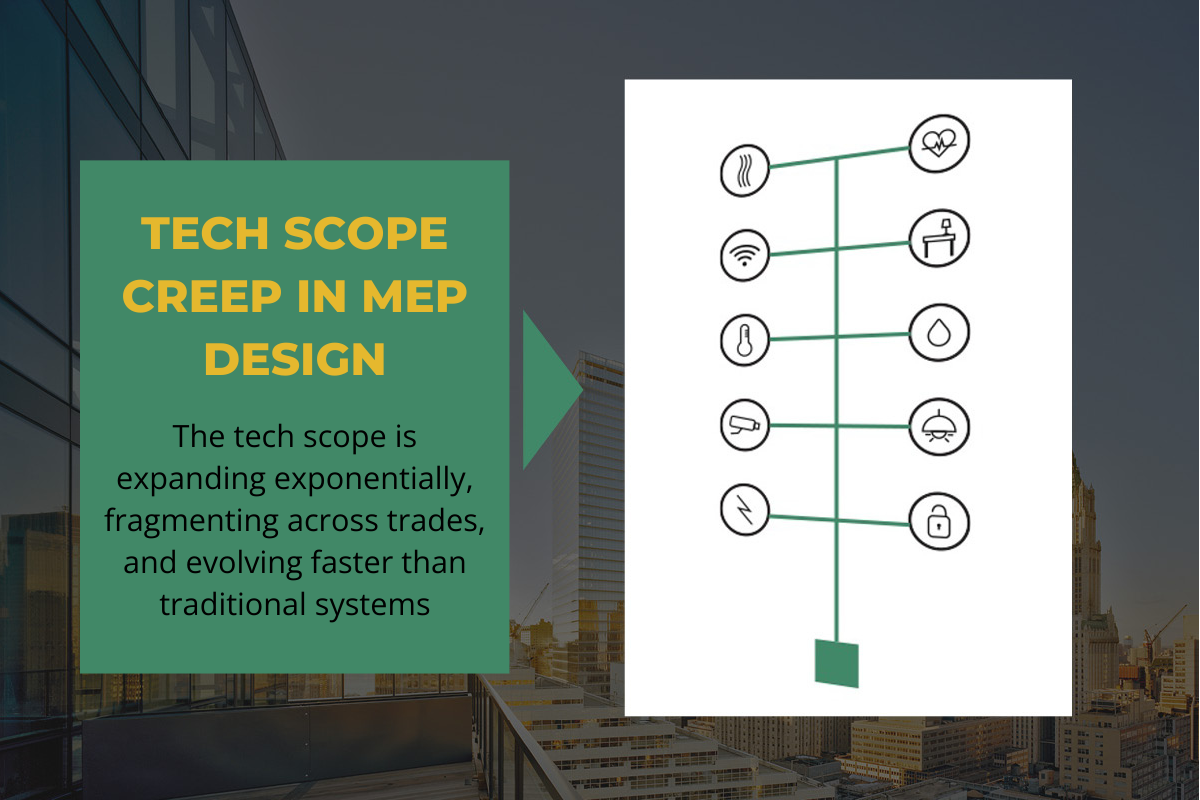The Expanding Role of Technology in Building Systems
As telecom, Wi-Fi, security, DAS, and smart building systems become just as critical to a successful building as plumbing, electrical, and HVAC, MEP firms are increasingly expected to integrate technology into their designs.
The challenge isn't whether technology is important — MEPs already know it is. The real question is how to manage a technology scope that is expanding rapidly, fragmenting across different trades, and requiring an evolving level of specialization.
What's Driving the Rising Technology Scope
Several forces are converging to push technology systems into the core of every project:
- Changing Tenant and Owner Expectations: Clients now demand seamless connectivity, smart systems, robust security, and future-ready infrastructure from day one.
- New Code and Regulatory Requirements: Telecom pathways, in-building wireless (DAS), emergency communications, and cybersecurity standards are becoming more stringent.
- Rapid Technological Innovation: AI-driven security, IoT-enabled HVAC and lighting systems, and 5G/6G readiness are no longer "nice to haves"—they're expected.
Technology isn't standing still. Systems that were "state of the art" five years ago are already being replaced. This pace of change is unlike anything in traditional MEP disciplines.
Why Traditional Piece-Mealed Approaches No Longer Work
Historically, tech systems were scattered across different trades: electricians pulled some data cabling, AV vendors handled conference rooms, security installers managed access control, and lighting consultants specified smart switches.
This piecemeal approach creates problems:
- Duplication and Inefficiency: Without centralized planning, cabling pathways are oversized or underbuilt, telecom closets are misplaced, and coordination between systems breaks down.
- Disjointed User Experience: Tenants end up juggling separate systems for Wi-Fi, building access, video conferencing, and energy management — leading to frustration and frequent upgrades.
- Increased Risk for MEPs: When tech systems underperform or conflict with core building systems, MEPs often get pulled back into costly rework, RFIs, and blame.
Without a clear "Technology General Contractor" role, the responsibility for making tech systems work often defaults back to the MEP team — whether or not they were originally tasked with it.
The Opportunity for MEP Firms
The good news? Firms that embrace the rising technology scope strategically can differentiate themselves.
- Lead Early Coordination: Treat telecom, Wi-Fi, security, and DAS like essential building systems that deserve a seat at the early design table.
- Bring in Specialized Tech Partners: You don't have to do it all in-house — but you do need trusted experts who can design, install, and support complex tech systems.
- Future-Proof Your Projects: Help owners plan for long-term flexibility, upgrades, and system integration from day one.
By leading smarter collaboration, MEP firms can deliver higher-performing spaces, protect project timelines and budgets, and build stronger relationships with owners, architects, and GCs.
The Future Belongs to the Integrators
Technology has earned its place alongside mechanical, electrical, and plumbing as a fourth critical utility. The firms that treat it that way — by planning for it holistically, coordinating it proactively, and partnering wisely — are thriving.
Managing the rising technology scope isn't about doing everything yourself. It's about recognizing complexity early, building the right team, and leading the process.
The future belongs to those who integrate smarter. Let's build it together.

